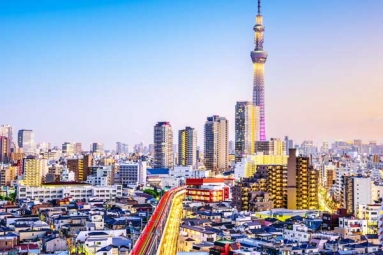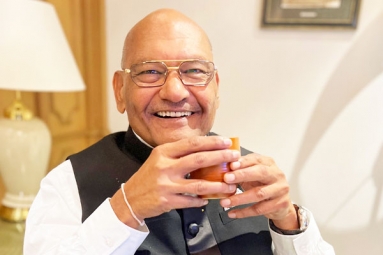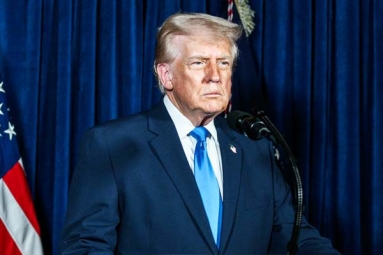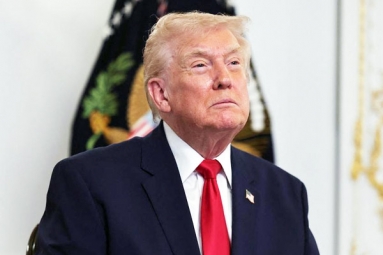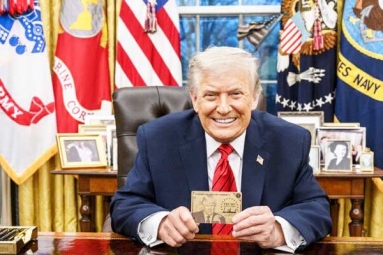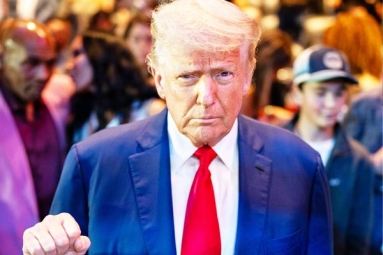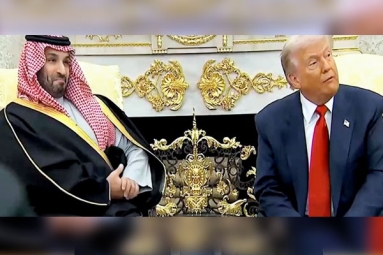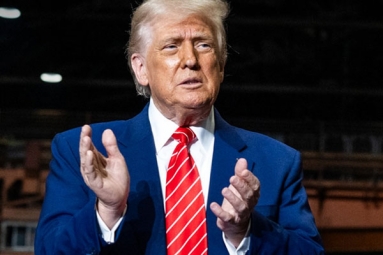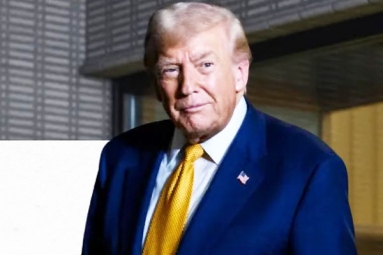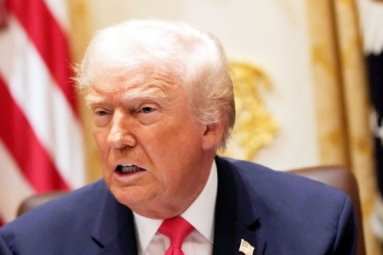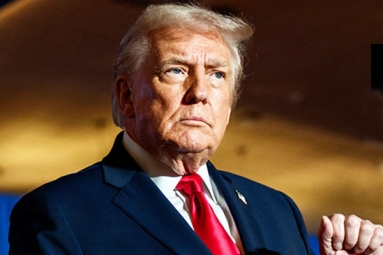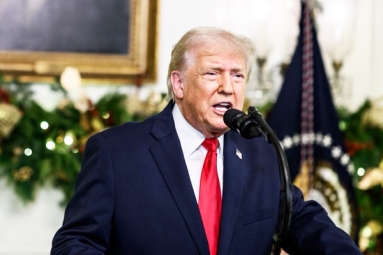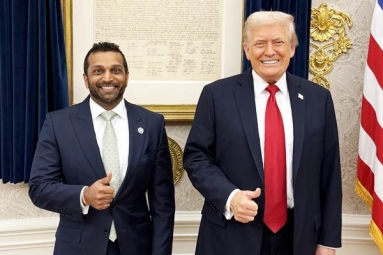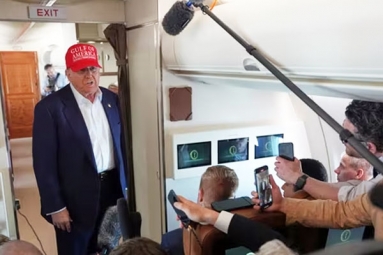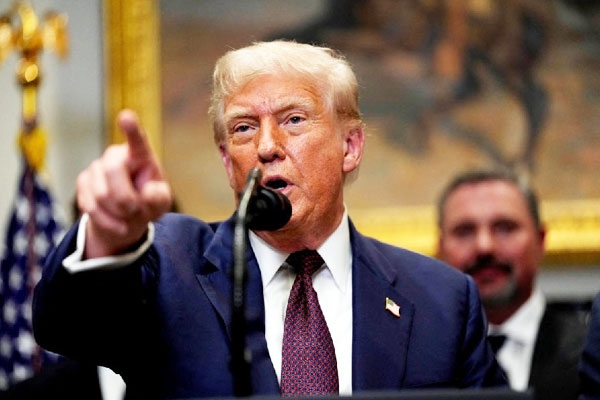
(Image source from: REUTERS)
One reason that Washington has imposed harsh tariffs on New Delhi is that US President Donald Trump is upset with India for overlooking his supposed role in mediating a peace agreement with Pakistan after the military clash in May, according to former diplomat Vikas Swarup. The ex-High Commissioner to Canada, who is also a well-known writer, described the current relationship between the United States and Pakistan as a temporary arrangement mainly motivated by financial concerns, while highlighting that the connection between the US and India remains significant. In a discussion with news agency ANI, Swarup praised New Delhi for not giving in to the Trump administration's demands during trade negotiations and mentioned that Trump's tariffs would ultimately cause rising inflation in the US. "We should realize why these tariffs have been placed... First, Trump is not pleased with India because we are part of BRICS... he believes that BRICS is an alliance against America that is intent on developing an alternative currency to the dollar... he thinks India should not be part of BRICS," he stated during the interview.
Additionally, Swarup pointed out that another factor is India’s refusal to credit Trump for facilitating a peace agreement with Pakistan following Operation Sindoor in May. From the outset, India has insisted that the US had no part in the ceasefire discussions, as India does not accept help from outside parties. The agreement was negotiated directly between the two countries' military forces at the request of Pakistan's Director General of Military Operations. "Trump has stated nearly 30 times that he was the one who helped the two nations step back from danger, preventing a nuclear disaster in the region. He is annoyed that India has not recognized his contribution while Pakistan has not only acknowledged it but even put him forward for a Nobel Peace Prize," Swarup said. India executed Operation Sindoor in early May in response to a terrorist attack in Pahalgam and conducted precise strikes on terror facilities in Pakistan and Pakistan-administered Kashmir. India successfully defended against further Pakistani actions and targeted its airbases.
The former diplomat remarked that India has stood firm against US pressures during trade discussions regarding greater access to its agriculture and dairy industries, with Washington employing pressure tactics to persuade India to accept its ambitious demands. "This is part of his strategy to pressure India into agreeing on the extensive demands that the US is making regarding access to our dairy and agriculture, and genetically modified (GM) crops. We haven’t given in, and it also serves as a message to Russia since he is also frustrated that he hasn’t convinced President Putin to agree to the ceasefire that Zelensky has accepted," he added.
Trump and Putin are scheduled to meet in Alaska this Friday, raising concerns in Kyiv and among its allies that the two leaders might attempt to set the peace terms for the ongoing three and a half year conflict. A former diplomat emphasized that the American president, who is a businessman, has made it a key point to be seen as a mediator for peace.
"Consider all the conflicts he has been involved in resolving, such as those in Thailand and Cambodia, Rwanda and the Democratic Republic of Congo, as well as Armenia and Azerbaijan; he has inserted himself in all these situations. He believes the most significant was the issue between India and Pakistan since both are nuclear nations. So from that standpoint, Trump thinks he deserves recognition," he stated. Swarup remarked that Barack Obama is the only U.S. president to have been awarded the Nobel Peace Prize and that Trump "really wants to surpass what Obama achieved." "He has openly expressed his desire for that Nobel Peace Prize. He is optimistic that even if he doesn’t achieve it through these conflicts, if he can facilitate a ceasefire between Russia and Ukraine, it could be his pathway to the Nobel Peace Prize," he explained. Swarup added that India’s foreign policy is not responsible for the recent U.S. shift toward Pakistan. He noted that Islamabad, through lobbying and strategic communication firms, has increased its influence in Washington.
"Pakistan, via some intermediaries, has managed to gain the attention of the U.S. President, which is why Asim Munir has visited Washington twice along with the so-called 'deal' regarding Pakistan's 'oil reserves,'" he mentioned. The former diplomat also highlighted Pakistan’s efforts to establish itself as a bitcoin mining hub. Recently, a cryptocurrency initiative supported by President Trump signed an agreement with Pakistan's crypto council. "I believe Pakistan is attempting to label itself as the 'Crypto King' of South Asia, and through World Liberty Financial, in which Trump’s family has investments, it seems Pakistan is trying to position itself as a trustworthy partner... All of these factors have contributed to Trump adopting a more lenient stance towards Pakistan," he noted.
"However, this does not imply that he has abandoned India or that he views India as an opponent. I believe this is part of his strategy to press for a more advantageous agreement. India should not yield because our strategic independence is not up for negotiation," Swarup added. Swarup stated that America's relationship with India should not be viewed in the same way as its ties with Pakistan, indicating that Washington and New Delhi's connection is more strategic than transactional.
"I believe that the current connection between the United States and Pakistan is mainly based on short-term tactics and largely driven by the financial interests the Trump family and Witkoff family aim to achieve from cryptocurrency investments in Pakistan. In contrast, I view the U.S.-India relationship as more strategic. It is less focused on transactions compared to the one with Pakistan. This is why I see the relationship with Pakistan as a temporary situation. I refer to it as a storm, not a break. You merely need to endure the storms. They do pass eventually,” he remarked.
He continued, “I view it as a strategic error for the U.S. to align closely with Pakistan, a nation that has ties with China, which is a competitor to the U.S. in strategy.” He pointed out that India has acted correctly by resisting the Trump administration's pressure during trade discussions to open up its agricultural and dairy markets. Swarup stated, “The U.S. labeled India as a 'Tariff King,' but now the real 'Tariff King' worldwide is the United States.” He mentioned that actions taken by President Donald Trump will likely lead to increasing inflation in the U.S. “The U.S. accused India of being a 'Tariff King,' yet now it holds that title since its average tariff is around 15.98 percent while the U.S. rate stands at 18.4 percent. Therefore, the U.S. is now the ‘Tariff King’ globally. However, it’s important to recognize that tariffs generate revenue. They are expected to bring in around 100 billion dollars annually for the U.S. The concern is who ultimately pays these tariffs? It will be American buyers. Consequently, this will result in higher inflation in America and prices there will rise. I believe that is when the consequences will become apparent,” he stated.
“If you give in to a bully, they will continue to make more demands. This means there will only be more requests. So, I believe we have acted rightly. India is too big and proud to follow another country. Our ability to make independent decisions has been the foundation of our foreign policy since the 1950s. I don’t think any government in Delhi can give that up,” he added. President Trump declared a 25 percent tariff on Indian products along with an undisclosed penalty in July, even though there was optimism for a temporary trade agreement between India and the U.S. that might have prevented these high tariffs. Shortly after, he imposed another 25 percent tariff, bringing the total to 50 percent on India’s imports of Russian oil. The former diplomat mentioned that Pakistan is on edge due to India halting the Indus Waters Treaty, and that Pakistan’s Army Chief Asim Munir has attempted to incite fears of nuclear conflict, as Pakistan consistently seeks external intervention.
He pointed out that Pakistan relies a lot on the river water mentioned in the Indus Waters Treaty. New Delhi implemented several actions against Pakistan following the terrorist incident in Pahalgam and paused the Indus Waters Treaty. He mentioned recent comments from Asim Munir, stating that Pakistan is intentionally trying to create a situation of nuclear intimidation to gain global attention. "Pakistan is unnerved by our decision to pause the Indus Waters Treaty. They depend a lot on the water from those rivers... So, what they are warning is that if India constructs a dam, which is not about to happen soon, we will destroy those dams; we will use our missiles to take them out. It's much easier to talk about than to actually do... What he (Asim Munir) consistently attempts to create is the fear of a nuclear conflict between India and Pakistan because Pakistan always seeks outside intervention... They are purposely stirring up nuclear intimidation just to grab the world's attention..." Vikas Swarup stated. India criticized the comments made by the Pakistani Chief of Army Staff during his trip to the United States, where he issued a nuclear threat.



